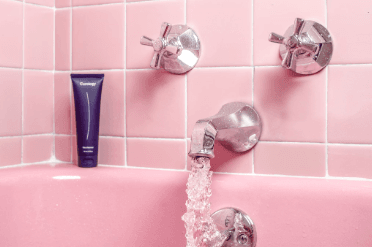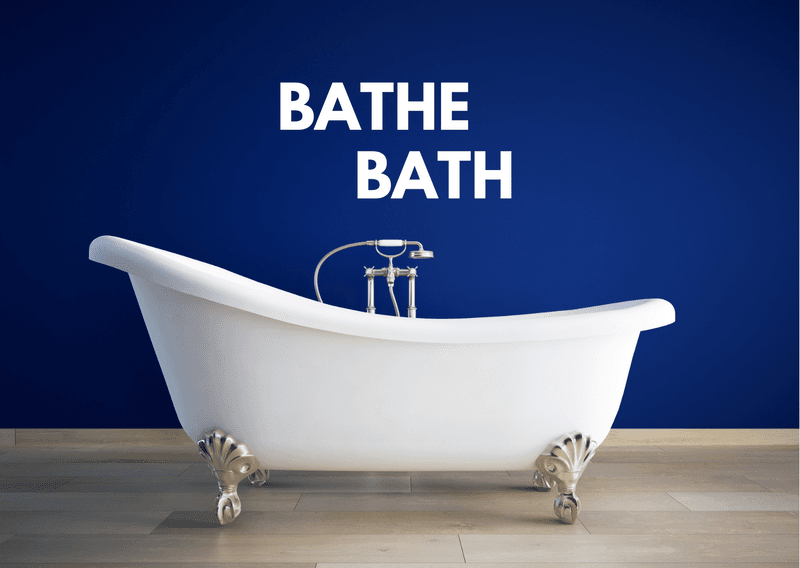Soapy Semantics: Unraveling the Debate Between 'Bathe' and 'Bath
Contents

Imagine you are a football coach sharing your morning routine, saying, "Every morning, I bathe in cold water." But if you meant to express that you take a shower or soak yourself in a tub filled with cold water, 'bath' would be the correct term. Using 'bathe' instead could lead to confusion as it usually implies helping someone else clean themselves or indulging in activities like sunbathing.
The words "bathe" and "bath" may seem identical at first glance, but they are used differently in spoken and written English. Understanding the distinction between these words is crucial. The right usage can not only enhance your communication skills but also boost your confidence in professional and personal interactions.
This article will delve into these subtleties bathe vs bath meaning, helping you master their use in everyday situations. Let's get started!
What are Bathe and Bath?
'Bathe' and 'bath' can be quite confusing for non-native speakers, like in India.
Firstly, 'bathe' is a verb that means to clean oneself by immersing in water or washing oneself.
Conversely, 'bath' is a noun referring to the act of cleaning oneself in a tub or basin filled with water.
One common misconception surrounding these terms is that they're interchangeable. However, their usage depends heavily on context. Incorrect usage can lead to awkward sentences and misunderstandings.
Let's look at this simple comparison table:
Bathe | Bath | |
Part of Speech | Verb | Noun |
Meaning | To clean oneself by submerging in water or washing. | The act of cleaning oneself in a tub or basin. |
Example | "She likes to bathe in the evening." | "He took a quick bath before heading out." |
When Should You Use Bathe?
The term 'bathe' is often used in the context of cleaning oneself or another. It is a verb, an action word that indicates the act of washing. For example, in a conversation between two friends, one could say, "I bathe every morning before leaving for work." Here, 'bathe' refers to the action of washing oneself.
Another time when 'bathe' can be used is when referring to immersing something in a liquid. In a culinary context, one might say "Bathe the chicken pieces in the marinade overnight." This means immersing the chicken in the marinade.
When Should You Use Bath?
The word 'bath', on the other hand, can be used as both a noun and a verb. As a noun, it refers to an act or process of immersing oneself in water or any other liquid for cleaning or therapeutic purposes. Example: "She enjoys taking a hot bath after a long day."
As a verb, 'bath' is predominantly used in British English to describe giving someone (usually children or pets) a bath. For instance: "I need to bath my dog this evening."
Common Mistakes Made with Bathe and Bath

One common grammatical quirk that non-native English speakers often struggle with is the use of 'bathe' and 'bath'.
Using 'bathe' instead of 'bath'. Remember, 'bath' is a noun, referring to the act or process of bathing.
Misusing 'bathe' as a noun. ‘Bathe’ is a verb indicating the action of cleaning oneself or someone else in water.
Here are two tips to avoid these common mistakes:
Always remember: 'bathe' is a verb and 'bath' is a noun.
Practice using these words in sentences until you can do it naturally without second-guessing yourself.
How to Improve Your Vocabulary Understanding
Improving vocabulary understanding is a vital step towards mastering English, particularly when it comes to differentiating between similar words like 'bathe' and 'bath'. Here are four simple strategies to enhance your vocabulary:
Regular Practice: Set aside 15 minutes every day to learn new words. Incorporate them in your daily conversations and writings.
Use Dictionary Apps: These not only provide meanings but also synonyms, antonyms, and usage examples. They can clarify the difference in usage between 'bathe' (a verb meaning to clean oneself with water) and 'bath' (a noun referring to an act of washing or the container used for bathing).
Contextual Learning: Practice using new vocabulary in sentences to understand their practical use better.
How Clapingo Can Help You Master English Usage
To get the hang of subtle English usage like 'bathe vs bath' or 'loose vs lose', personalized learning can make all the difference. At Clapingo, we offer one-on-one coaching sessions that focus on your individual needs and areas for improvement.
Moreover, Clapingo's unique feature of instruction in your native language (like Tamil or Telugu) creates a comfortable learning environment for you. This way, you don't have to worry about misunderstanding concepts because of unfamiliarity with the language used for instruction.
Key Takeaways
Here are the main points we've covered:
'Bathe' is a verb meaning to cleanse oneself in water or light, while 'bath' is predominantly a noun referring to the act of bathing or the container where one bathes.
Misusage often occurs when 'bath' is used as a verb, which is incorrect in standard English but common in some dialects. Avoid saying ‘I bath daily’ – instead say ‘I take a bath daily’ or ‘I bathe daily’.
The more you use these words correctly in your daily conversations, read them in texts, and listen to them in dialogues, the easier they'll become part of your natural vocabulary.
Remember that understanding such nuances is part of mastering English fluency - but it's okay to stumble and make mistakes on this journey. Keep practising! Utilise resources like Clapingo that offer personalized coaching sessions with native English speakers who understand your challenges and offer solutions tailored to you.
Start your English learning journey today!
FAQs
1. What does 'bathe' mean?
'Bathe', primarily a verb, refers to the act of cleaning oneself by immersing in water, usually in a bathtub or shower. For example, you can say "I prefer to bathe in the morning."
2. What does 'bath' mean?
'Bath' is primarily a noun and refers to an act or process of washing yourself in a tub filled with water. It can also refer to the bathtub itself. For instance, "After a long day at work, taking a hot bath feels relaxing."
3. Can 'bath' be used as a verb?
Yes, but it's less common and is more frequently used in certain dialects of English. An example could be "I need to bath the dog today.
Comments
Your comment has been submitted